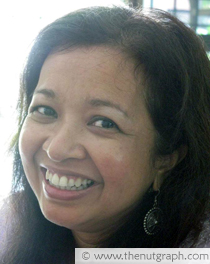
DATIN Paduka Marina Mahathir is a renowned and often controversial Malaysian activist, writer, and commentator. She has worked in a variety of fields, from heading the Malaysian AIDS Council, to kicking off the successful feminist television programme 3R, to holding a bi-weekly column in The Star. She is currently a board member for Muslim women’s organisation Sisters in Islam.
But controversy surrounds Marina also because of her lineage — she is the eldest child of Malaysia’s longest serving and controversial Prime Minister Tun Dr Mahathir Mohamad. In this exclusive interview with The Nut Graph in Kuala Lumpur on 23 March 2010, Marina talks about her childhood, her roots, and the Malaysia she wants to see in the future. The first version of this interview was published exclusively in Volume 1 of Found in Malaysia.
TNG: When and where were you born?
Marina Mahathir: I was born in Alor Setar, in 1957. I am just two months older than the country. [I was born in the] Alor Setar General Hospital and so were all my siblings.
We used to live in Jalan Maxwell. At the back [were] the padi fields and the railway road. We lived [in the government quarters] until I was 10.
We [then] moved to Jitra, [and we lived in government quarters] because [my mum] was the civil servant; my dad went into private practice quite early. In 1968 or 1969, we moved into our own house in Titi Gajah.
Did the violence of 13 May 1969 touch Alor Setar?
As far as I recall there were no riots. But there was fear. I remember the elections. I remember asking my dad, “So, did you win?” And he said, “No, I lost.” And I couldn’t believe it, because at that time he ran in Kota Setar Selatan. He lost to (former PAS chief) Haji Yusuf Rawa, who happens to be my mum’s cousin, [but] not a first cousin.
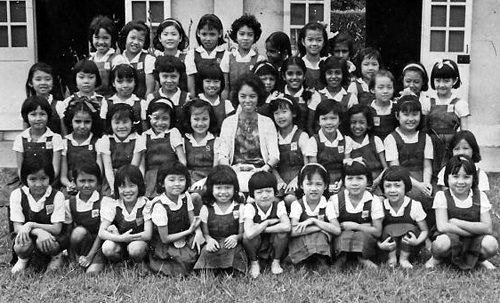
So you are related to PAS central committee member Muhajid Yusof Rawa?
Yes. But it’s not like we’ve ever met lah. On my mum’s side, my grandfather is Rawanese. He came from Sumatera. We still have relatives in Sumatera. In 1968, our first overseas holiday was to Medan. A couple of years ago, after the tsunami, [my parents] went to Medan and visited all these relatives as well. My mum is very keen on all this, and she will keep track.
So you can trace your ancestry on your mum’s side. This is the million ringgit question: What about your dad’s side?
We don’t know. My dad had these two older sisters whom he was very close to. The second sister, Mak Bibi, had a very good memory [about] all sorts of family connections. But unfortunately, she passed away first. The older sister — she’s 10 years older than my dad, who is the youngest — was hard of hearing. She passed away last year.
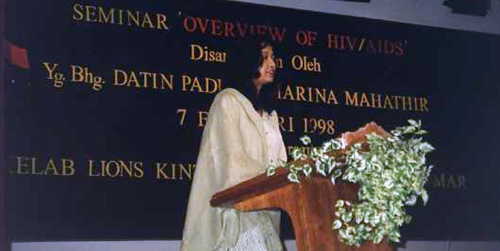
But there is a Malabari connection on your dad’s side?
Well, actually this was news to me recently. I have another aunt, [a close family friend] who is not directly related, [who] once told me where the family came from. I was quite young, so I didn’t really take note. But it formed the impression in my mind that we must have come from the Eastern coast of India. But I never checked it out.
It was only when I went for this aunt’s funeral that I asked my cousins where they thought we came from. And that was the first time the word Kerala came up. I looked it up and I thought, “Eh, that’s funny — it’s on the Western coast [of India].” […]
But then with ports, what does it matter? You get on a boat and then you go. And there are a lot of Keralans here — Hindus, Muslims and Christians — so there is a long connection between Kerala and here. So it’s possible [to trace], but I wouldn’t know where to start. Because this would be my dad’s grandfather, my great-grandfather Tok Iskandar. […]
Iskandar came over and married a local woman and had my grandfather, Mohamad, and at least one other female sibling…my father’s auntie.
So, I only know of one sibling [of my grandfather’s]. But we don’t know what happened to my great-grandfather, or our great-grandmother. Nobody knows her name. It’s all [because of] very poorly kept records, or nobody thought of [keeping records].
So all these people who keep saying my grandfather’s name was Iskandar Kutty — we don’t know where that comes from. We’ve never heard the name.
How does that make you feel, though, the way detractors discredit your dad by pulling this out? Many would consider it racist.
Of course it is. And I think that’s why he’s so sensitive about it, because it [questions] his Malay-ness. I had this ex-schoolmate who used think it was funny, who still thinks it’s funny, to make jokes and tease us for being keling. So it’s a sensitive thing, because you’re subjected to so much racism.
[But] when I went back for my aunt’s funeral, I looked at everyone around and it was quite clear that we all have sub-continental origins.
My grandfather’s mother was Malay, and he was brought up by her. And then he married a Malay, my grandmother, who is a Wan. Wans were palace[-connected], so that Wan side is well-documented. My dad’s mum was Wan Tempahwan.
Was Alor Setar very cosmopolitan [when you were growing up]?
We had a mixed group of friends. My first best friend when I was in kindergarten was Ann Wong, who lived across the road.
[I also went to] a convent [school]. A lot of Malays didn’t want to send their daughters there, because takut jadi Kristian, kan? So in my class, I think there were no more than four Malay girls at any one time.
When I was in Form Four, I went off to TKC (Tunku Kurshiah College). In Form Five, I sent a postcard back to my old school: “Good luck for MCE (Malaysian Certificate of Education), hope to see you all here.” And that was a big faux pas, because obviously I wasn’t going to be seeing the Chinese ones there. So apparently I upset a lot of people. But I really didn’t think of it in that way.
How has all of this, including the faux pas, shaped the kind of Malaysian you are today?
I’m very sad. I don’t understand all this segregation. I went through it when [convent schools were] English medium, and I know, for instance, that there was no attempt to convert anyone either way.
At first I didn’t want to go to TKC because it was single-race. And my dad got a bit upset about that. But [in the end] it was quite good in one thing. You know, early impressions can really get into your head. I had grown up with the impression that Malay [Malaysians] were not clever. I used to get first or second, but there’s the impression that others are cleverer than you.
So when I went to TKC, I saw Malay girls who had gotten 7As, 8As. Adakah? It really did something to your head. It’s possible [to achieve this] — we’re not genetically backward. So the positive aspect of that was good.
The other idea I grew up with was that girls were not as clever as boys. It’s only when I went to Sultan Abdul Hamid College (SAHC) — briefly in Form Four before going to TKC and then in Lower Six — that I realised that not all boys are smart. So sometimes you need this change of environment to open up the world for you.
In TKC, I was exposed to a whole variety of Malays — all classes and all type of faces. The hitam legam and the putih melepak. The Mat Salleh type pun ada. It was quite diverse.
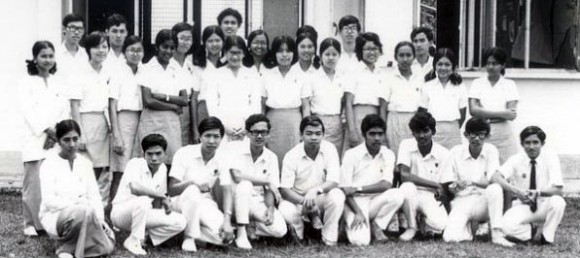
That intra-Malay diversity.
Yes, which was really interesting.
I had other problems there. I went there in 1972. This was after 1969, after my dad got kicked out of Umno, had written The Malay Dilemma and it got banned. So he was a famous personality.
[But in school,] the race thing wasn’t emphasised so much as getting ahead [was], girls being able to get educated and achieve. These [girls] were considered elites, like the cream of the Malay crop. Me, I just scraped through.
I only spent two years in TKC, and then went back to Alor Setar for six months, to SAHC, and then I went to England.
My dad refused to let us accept scholarships. He felt we didn’t [qualify] for scholarships; they’re not meant for people like us. It was also his own pride, that he felt he should be able to provide for his own kids.
At that time Mara was sending people to England, [and] they decided to experiment with sending kids at a younger age for “O” Levels. They did a test and found four boys who came from the same school, SAHC — including my brother, [Mirzan]. My father said, “No.” My brother cried and cried and cried, and in the end my father said yes. So he went. I think in the end Mara decided it was too expensive, so there was nobody else after that.
I thought about it recently, because Barry Wain (author of Malaysian Maverick: Mahathir Mohamad in Turbulent Times), asked me, [and] I said, “You know, Barry, I have a feeling that my dad might have made an arrangement with Mara so that my brother thought he was on a scholarship.” And I think about it now, [and] it’s entirely possible that in fact he wasn’t on a scholarship.
Me, too, I had the same allowance as a scholarship student. I wasn’t allowed to have more than that.
There are a lot of people now who are speaking for racial and religious diversity. But even when it wasn’t fashionable in 1999, there were a few people who spoke up against Pasrah (the People’s Voluntary Anti-Homosexual Movement), and you were one of them. That’s still something many Malaysians don’t think about when they talk about diversity.
Exactly. That one for me was like gut instinct. I was president of the Malaysian AIDS Council (MAC) at that time. We discussed [a statement I had written] and then sent it out. But I got phone calls from people who said, “Thank you.”
At that time, [Pasrah] was a reaction against the (Datuk Seri) Anwar Ibrahim [sodomy trial]. And it was [spearheaded by] (Datuk) Ibrahim Ali.
Pasrah was started by (Pasir Mas MP) Ibrahim Ali?
Yes! And he might have been in Umno, but he was doing it on his own. I remember I texted my brother, Mokhzani, who was treasurer of Umno youth at that time. I said, “Are you holding a press conference?” He said, “No.” And that’s when I found out Ibrahim Ali was doing it on his own.
Is there anything you struggle with as a Malaysian? Is it particularly hard being a liberal, Muslim woman?
Oh ya. We are the first line of attack, I think. Because you’re female so there’s the perception that you’re weaker and therefore can be attacked. And then you’re Muslim but talking about a non-mainstream viewpoint.
I suspect sometimes there’s a fear that, “What if I read the Quran and it says completely different things from what I’ve been told?” And they’ve been told that if you have these doubts, it’s already sinful.
I think people are scared if they feel [doubtful], dah berdosa dah. But when things don’t gel, how do they deal with it? I deal with it by going to learn more.
Are you comfortable using the word “liberal” to describe yourself? [There’s a stigma attached to it.]
Ya, “liberal”, “progressive”, I don’t really have a problem with it.
It’s easy for people to discredit liberals or progressives by pointing at all the so-called negative aspects. […] Every time you stereotype people, somebody is stereotyping you somewhere. And if you think that the stereotype about you is unfair, what about your stereotype of someone else? It’s something we have to keep remembering.
And I find extremely annoying stereotypes of Muslim women in the West. I’ve had somebody say to me, “You’re Muslim? Oh it must be so difficult to be so oppressed all the time.”
Or, “You can’t be progressive and Muslim because then you’re a hypocrite.”
That I [really resent].
I [also] hear this all the time, “How can you be feminist and Muslim?” Like it’s so incompatible, like being gay and Muslim. I mean, who are you to tell me?
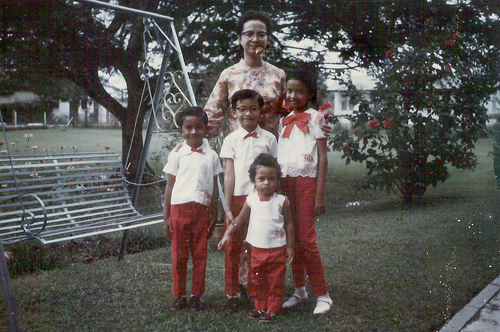
Describe the kind of Malaysia you would like for yourself, your kids and future generations.
I think the biggest worry for [many parents] is our kids. All parents want them to come home. But what do they come home to? They have to come home to a country where they can fulfil their potential. On the face of it, my kids are [bumiputera], Malay — by today’s standards they should be okay. But they are Muslim women — that might be a barrier to many things the way things are going now. And that’s really disturbing.
It’s not just a matter of getting a job, but feeling that you can breathe is important, too. I don’t want my kids to go around always looking over their shoulder.
I mean, we’ve always been a nosy society, it’s a very Melayu thing. Once upon a time people wouldn’t really do anything. But now they might actually do something. You could wind up in jail or something. Not that I think my kids are going to do anything bad, but it’s their personal life.
Someone said to me, “What if your daughter comes to you and wants to be a Christian?” I said, “When she’s a child, it’s my duty to teach her the religion that she’s born in. That’s a duty of all Muslim parents. But when she’s an adult [and chooses otherwise], of course I’m going to be sad, because that’s the tradition I was brought up in. I might talk it out with her, but if she’s an adult, hopefully it wouldn’t be an overnight thing, like on a whim, or joining a cult. What can I do? And in the end we all have to answer for ourselves. So apa nak buat lagi.” Terdiam langsung.
Nowadays, tak tau lah. Everything is about sebat. No compassion, you know? As if the best way to prove how Islamic you are is to condemn someone else. It’s a negative way to do it.
And it’s about leadership lah. You have to say [and do] something because it’s right, not because it’s politically expedient. ![]()
The above interview with Marina Mahathir was first published exclusively in Volume 1 of Found in Malaysia. Vol 1, which features 54 earlier interviews, is currently in its second print run and retailing at RM45. Found in Malaysia Volume 2, which was launched on Malaysia Day 2011, is now available in bookstores for RM50. It features previously unpublished interviews with Asha Gill, Lillian Too, Khairy Jamaluddin and Baru Bian.
*Correction: This photo caption originally stated that Marina was the only daughter. This is incorrect. There is another daughter named Melinda. We apologise for the error.


Adam says
I have always admired Marina and loved to read her column “Musings”. She was and still is her own person, notwithstanding her being the daughter of Dr M. She has inherited the strong character of her father, luckily without the scheming trait. In this, she has the conscientiousness of her mother, who I also admire. How not to be amazed by this lady who has managed to avoid the dirtiness of politics and still be able to stand by her man through all the havoc he has churned up? Incredible.
In a way, Marina could be considered as the redeeming factor for what the old man has done to the country. The charitable work she has done under the Malaysian Aids Council is a feather in her cap. Being a board member of SIS, she would be in the forefront of promoting the cause of fairness and justice for Muslim women in particular and for women in general with other NGOs such as Awam, WAO, WCC, etc.
As conscientious [folks], we have to land our support to Marina and all of her kind, in creating a society where everyone irrespective of gender, colour or creed would be treated fairly and with respect. Continue the good work, Datin Paduka!
factcheck says
Caption to the last photo reads “The only daughter…”. What about Melinda Mahathir?